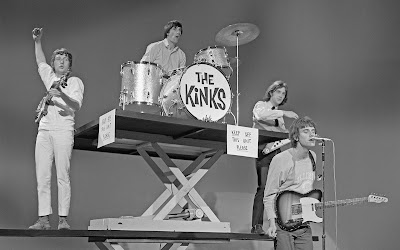I was inspired by a podcast called The 500 hosted by Los Angeles-based comedian Josh Adam Meyers. His goal, and mine, is to explore Rolling Stone Magazine's 2012 edition of The 500 Greatest Albums of All Time.
Album: #232
Album Title: Kink Kronikles
Artist: The Kinks
Genre: Rock - Pop
Recorded: Pye Studios and Morgan Studios, London, U.K. (1966-1971)
Released: March, 1972
My age at release: 6
How familiar was I with it before this week: Somewhat
My age at release: 6
How familiar was I with it before this week: Somewhat
Is it on the 2020 list? No
Song I am putting on my Spotify Playlist: Apeman
Happy New Year, folks.
Song I am putting on my Spotify Playlist: Apeman
For over a decade, I have started the school year each September by sharing a quote with my students. It is often ascribed to musician and composer Frank Zappa (#297 and #246 on The 500), although I can't verify this. Regardless, it reads: "A mind is like a parachute, it doesn't work if it is not open."
My purpose is to encourage my young charges to approach the challenges and opportunities of the new school year with an open mind and a willingness to take risks. At a time when social media has super-charged the dissemination of misinformation and, worse still, disinformation, it is essential to foster critical thinking by creating an environment in which students can handle a steady bombardment of new information by questioning and analyzing what is being said. Through analysis, my pre-teens learn to sort the chaff from the wheat – to determine what can be substantiated through facts and research in order to form sound opinions.
That is where I fell down as a teen, but learned a lesson that I am anxious to pass on to my students because in my younger, impressionable days I was not particularly skilled at "open-mindedness". I would frequently lock in an opinion based on limited information, and fiercely defend it because, as a friend eventually pointed out, accurately: "You always think you have the corner on the truth, and you don't." It was a tough pill to swallow; but it helped me change for the better (a little at least).
Back in the day, my rigid mindset was powerfully and, in retrospect, comically evident in my taste in music. I once decided that I hated the hard rock band AC/DC because a guy on my water-polo team wore an AC/DC T-shirt and told me that my favourite band, Rush, sucked. I remained adamant in my petulant view until I was nearly twenty when the undeniable talent of AC/DC (with records at #200 and #77 on The 500) disabused me of my stubborn notion.
My purpose is to encourage my young charges to approach the challenges and opportunities of the new school year with an open mind and a willingness to take risks. At a time when social media has super-charged the dissemination of misinformation and, worse still, disinformation, it is essential to foster critical thinking by creating an environment in which students can handle a steady bombardment of new information by questioning and analyzing what is being said. Through analysis, my pre-teens learn to sort the chaff from the wheat – to determine what can be substantiated through facts and research in order to form sound opinions.
That is where I fell down as a teen, but learned a lesson that I am anxious to pass on to my students because in my younger, impressionable days I was not particularly skilled at "open-mindedness". I would frequently lock in an opinion based on limited information, and fiercely defend it because, as a friend eventually pointed out, accurately: "You always think you have the corner on the truth, and you don't." It was a tough pill to swallow; but it helped me change for the better (a little at least).
Back in the day, my rigid mindset was powerfully and, in retrospect, comically evident in my taste in music. I once decided that I hated the hard rock band AC/DC because a guy on my water-polo team wore an AC/DC T-shirt and told me that my favourite band, Rush, sucked. I remained adamant in my petulant view until I was nearly twenty when the undeniable talent of AC/DC (with records at #200 and #77 on The 500) disabused me of my stubborn notion.
 |
| Album cover for Back In Black from ACDC #77 on The 500. |
This week's album is Kink Kronikles, the third and final record from the British rock band, The Kinks, to appear on the The 500 list. I wrote about #289, Something Else By The Kinks, in November, 2022. My frequent guest blogger, Various Artists, shared his connections with #258, The Kinks Are The Village Green Preservation Society, in July, 2023.
Kink Kronikles is an anthology that contains 14 tracks from the band's five previous albums, as well as 13 non-album singles. It was compiled without input from the band members. Rather, it was curated by musician, rock journalist (and Kinks’ fan) John Mendelsohn.
Mendelsohn was approached by the record company Reprise to assemble a two-record set specifically designed to re-introduce American audiences to the group. Although The Kinks had early success in the coveted United States market, particularly with the 1964 hit You Really Got Me, their popularity waned between 1965 and 1971 after being banned from performing in America.
 |
| The Kinks in the 60s were (l-r) Ray Davies, Mick Avory, Peter Quaife and Dave Davies. |
 |
| John Mendelsohn (1970s) |
 |
| The Kinks, performing in the 60s. |
As I covered in my previous post, The Kinks were a volatile group, with brothers Ray and Dave Davies regularly coming to blows on stage. In 1965, following a mid-year tour of the United States, The American Federation of Musicians began refusing permits for the band to perform because of their public behavior. The prohibition lasted four years, right into the heart of The British Invasion when their contemporaries, such as The Beatles, The Rolling Stones and The Who, were making hay while the sun shined.
Shortly after starting my journey through The 500, I encountered many anthologies and "best of" albums on the list. The first record was Loretta Lynn's All Time Greatest Hits (#478). I was firmly of the opinion that it did not belong there. In fact, I wrote.
.jpg) |
| Four bands considered part of The British Invasion. |
"(the Lynn record) seemed an unusual choice for the Rolling Stone list. It isn't an album - it's a collection of songs from many albums. Somehow, that seems like cheating."
However, I have opened my parachute mind, and revised my opinion on compilations on The 500 list. It was the aforementioned Various Artists, who first pushed back on my stance. He offered several instances and cogent arguments about the value of these collections. Kink Kronikles,is one of several examples on the list of a thoughtfully and artistically organized compendium of a musician's or band's songs. It is not a haphazard collection of hits intended to repackage existing material for another bite at the financial apple.
These records are also top sellers, universally loved by millions. Of the 100 All-Time Best Selling Albums Worldwide, 17 are Greatest Hits or Anthology releases -- including four in the Top 20. That doesn't include another eight on the 100 that are soundtrack compilations.
Consequently, the guy who thought these records were "cheats" back in 2019 has given up his corner on the truth. One might argue that a few of the records are simply a way to shoehorn an important artist onto the list when a single album might not make the cut. But, that is a debate for another day, and it is certainly not the case for Kink Kronikles – an absolute gem of a compilation that I thoroughly enjoyed.These records are also top sellers, universally loved by millions. Of the 100 All-Time Best Selling Albums Worldwide, 17 are Greatest Hits or Anthology releases -- including four in the Top 20. That doesn't include another eight on the 100 that are soundtrack compilations.
Happy New Year, folks.






No comments:
Post a Comment